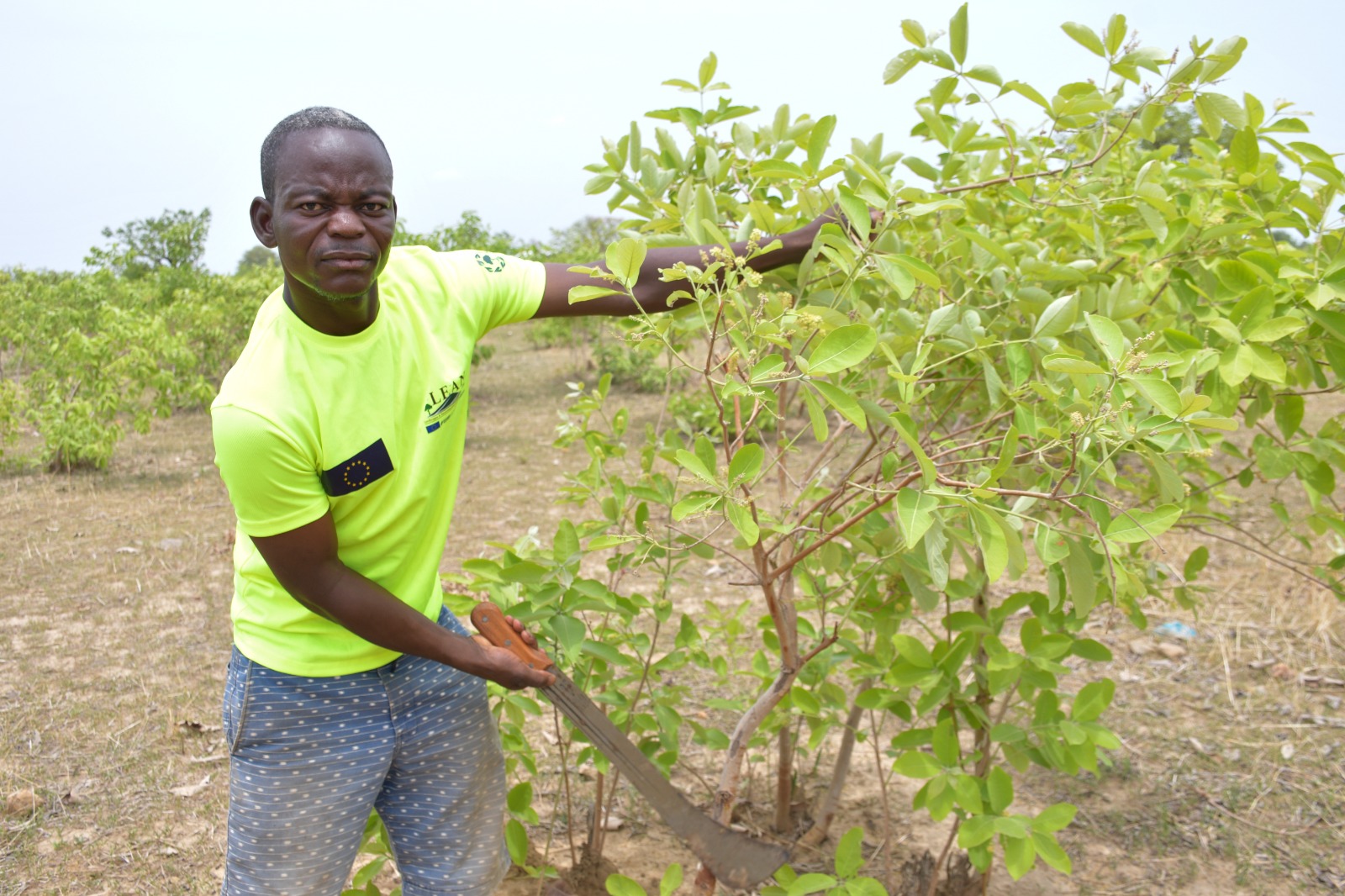EU-LEAN restores land, builds green futures
By: Francis Npong
In the Kassena Nankana West district of Ghana's Upper East region, the EU-funded landscape restoration initiative is transforming barren and fragile landscapes into fertile land, creating new opportunities for local people to thrive.
"Thanks to the EU-LEAN initiative, we have recovered several hectares of degraded land. We are happy that our surroundings are becoming greener and more beautiful," said Abdul-Nashiru, the lead farmer in the Navio-Samwo community.

An estimated 275.73 hectares of degraded land in 22 communities has been restored through farmer-managed natural regeneration (FMNR) and enrichment planting. One hundred farmers have also received training and support in beekeeping, and 1,500 women have been incorporated into 60 savings and transformation groups.
Additionally, the project has supported the establishment of four seedling nurseries, which have raised and distributed over 80,000 tree seedlings of various species for enrichment planting. Communities are not only reclaiming degraded lands, they are also adopting environmentally friendly practices such as avoiding burning and preventing commercial logging. 'We have stopped large-scale charcoal production and firewood harvesting. Also, the community fire volunteers who have been formed and trained are ensuring compliance with the non-bush burning bylaw. Consequently, the few fires that did emerge were quickly brought under control," said Abdul-Nashiru.
Abdul-Nashiru and other farmers are doing everything they can to reforest degraded areas in their communities. 'Restoring land to its original state is our responsibility, and it's a legacy we can leave for our children. It will also help to mitigate the impact of climate change on agriculture and natural resources," he said.
As part of the project, over 6,000 farmers received training in integrated landscape management approaches and 60 Savings for Transformation groups were established. Communities were also supported in developing alternative livelihoods, such as animal rearing. These initiatives have created jobs for locals, provided access to financial services, especially for women, and transformed the lives, incomes and livelihoods of the rural vulnerable community.
'Thanks to S4T groups, many women have been able to access small loans and start their own businesses. They no longer have to rely on selling firewood to earn an income. This has contributed to enhancing environmental agility in the project communities,' said Joseph Talata, a project officer at Kessena Nankana West District.
Joseph Yelkabong Edwin, the manager of the EU-LEAN Project at World Vision Ghana, said that the project's success is linked to the involvement and ownership of the project models by the communities. "World Vision Ghana created project models that directly address farmers’ needs," he said.
"Landscape restoration approaches such as farmer-managed natural regeneration (FMNR) and assisted natural regeneration (ANR) are cost-effective, efficient and quick methods of restoration that best suit landscapes where tree planting is difficult," he said.
"We are glad this project was introduced. Today, almost every woman in our community is a member of a S4T group. This made access to sustainable financial services available at our doorsteps. The lives coincomes, livelihoods of women have changed for good the better aid ",Vivian Adawona, a beneficiary.
Last year, for example, S4T groups, which were mostly made up of women, saved close to 700,000 Ghanaian cedis. They used these savings to access loans to meet their children's educational and health needs, as well as their household food needs. 'We are now able to confidently provide financial support for household maintenance, children’s education and any other financial needs, even in an emergency,' said Vivian.
In the Upper East region, where opportunities for economic advancement are scarce, the EU-LEAN Project is transforming wasteland into forests, while S4T groups are helping locals access sustainable financial services, improving income sources and livelihoods, and driving growth and development at the community level.
By using FMNR sites for beekeeping, farmers can diversify their livelihoods and income. The project initiatives boost economic prospects, foster community awareness and resilience to climate change and related hazards, and instil a sense of pride. As the project draws to a close in December, its sustainability has been amply demonstrated, and it could well be a catalyst for the prosperity and growth of the communities involved.
Implemented by World Vision Ghana in partnership with Rainforest Alliance, Tropenbos Ghana and Eco-Care Ghana, the EU-LEAN project has revived environmental agility in the Kessana Nankana West District and empowered local communities to create sustainable livelihoods, financial services and a greener future.